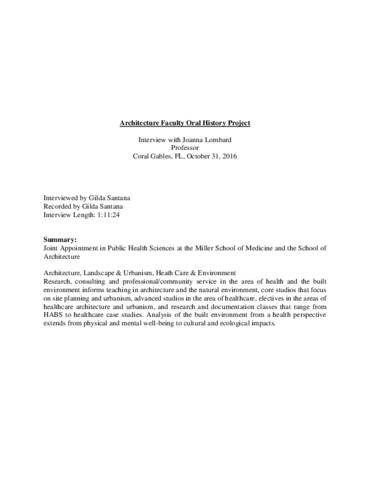Zone d'identification
Nom et localisation du dépôt
Niveau de description
Pièce
Titre
Interview Joanna Lombard, 31 October 2016
Date(s)
- 10/31/2016 (Production)
Importance matérielle
PDF document.
Nom du producteur
Notice biographique
Gilda Santana joined the faculty of the University of Miami Libraries in 2007 as Head of Architecture Information and Resources to direct the Paul Buisson Architecture Library. She led the expansion and redesign of the library now called the Architecture Research Center (ARC) in 2018. Her research interests include facilitating the culture of design research through studio embedded-librarianship and the evolution of digital humanities in architecture and the arts. In 2013 she became the Librarian for Art & Art History. Santana has a Master of Science in Architecture from the School of Architecture, University of Miami, a Master’s in Library and Information Science from Rutgers, The State University of New Jersey, and a Bachelor of Art from Bard College where she majored in Art History. She actively serves in the Association of Architecture School Librarians (AASL) and the Art Libraries Association of North America (ARLIS).
Nom du producteur
Notice biographique
Joanna Lombard, AIA, LEED AP, is a registered architect (Florida) and Professor at the University of Miami School of Architecture with a joint appointment in the Department of Public Health Sciences at the Miller School of Medicine and is a 2019-2020 Abess Faculty Scholar in the Leonard and Jayne Abess Center for Ecosystem Science and Policy. She holds a Bachelor of Architecture from Tulane University and a Master of Architecture from Harvard University Graduate School of Design. At UM, she is a founding member of the Built-Environment Behavior & Health Research Group with funded projects in the area of neighborhood design and health, currently studying the impacts of streetscape-greening on Miami-Dade Medicare beneficiaries. She is author and co-author of articles, book chapters, and books (most recent book chapter: “The Landscape Design Principles of William Lyman Phillips in the First Heritage Parks,” in Building Eden, The Beginning of Miami-Dade County’s Visionary Park System, ed. by Rocco Ceo, Pineapple Press, 2018). She is co-leader of one of the eleven university-based teams selected as charter members of the American Institute of Architects Design & Health Research Consortium, and a member of the University of Miami U-LINK team exploring “Hyper-localism: Transforming the Paradigm for Climate Adaptation.”
She has worked with colleagues at UM’s Abess Center, Georgetown and Harvard universities to organize a colloquium on climate migration (graphic report). During the summer of 2018 she was a member of the Robert Wood Johnson Foundation Evidence for Action: Culture of Health delegation to the One Water Summit 2018, and with colleagues from the University of Minnesota and Portland State, she convened a discussion group on climate migration at the AIA 2018 Collaborative Research Summit. In March of 2019 she participated in Georgetown Climate Center’s Roundtable on Managed Retreat. In addition to teaching in UM’s School of Architecture’s Architecture and Urban Design Programs, she collaborated with colleagues at CLEO and Van Alen to develop and teach a 3-day workshop for the CLEO/Van Alen Institute Climate Design Lab and continues to work with The Nature Conservancy to advance the Miami Cities Program’s Allapattah: Resilient Health District + Wagner Creek Greenspace Project.
Zone du contenu et de la structure
Portée et contenu
Interview to professor Joanna Lombard by Gilda Santana. Interview Length: 1:11:24 min.

